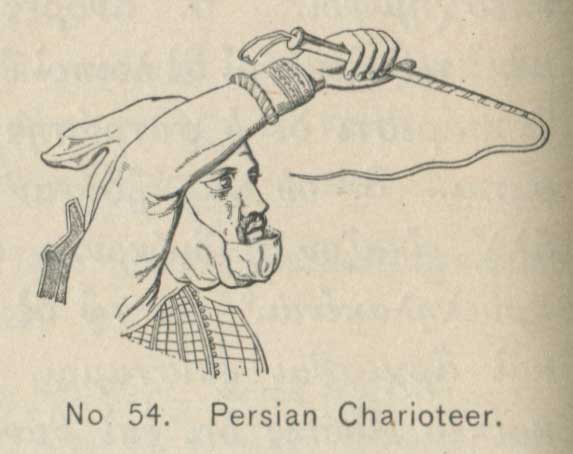THE FIRST GREEK BOOK
BY JOHN WILLIAMS WHITE, PH.D, LL.D., LITT.D.
Professor Of Ancient Greek At Harvard University
This Revision Copyright ©2012 by Shawn Irwin
Lesson LXXVIII - Second Perfect System without Tense
Suffix.
S717. A few verbs have second perfects and pluperfects formed without tense suffix, after the
anology of verbs in μι, the personal endings being added directly to the verb stem.
S718. Learn the conjugation of the second perfect system without tense suffix of ἵστημι in 792.
S719.
1. The indicative singular does not occur. ἑστώς (for ἑ-στα-ώς) is declined
ἑστώς, ἑστῶσα, ἑστός, genitive ἑστῶτος, ἑστώσης, ἑστῶτος, etc.
2. Other verbs have forms in the second perfect without suffix. Thus, βαίνω (βα), go, βεβᾶσι,
they have gone, participle βεβώς; θνῄσκω (θαν) die, τεθνᾶσι, they are dead, participle
τεθνεώς; δέδια (δὲ),` fear (compare δέδοικα), δεδίᾱσι,
they fear, participle δεδιώς.
S720. Here belongs also the irregular verb in μι, οἶδα (ἰδ, εἰδ), know, a
second perfect with present force, formed without reduplication, the pluperfect (as imperfect) being ᾔδη or
ᾔδειν.
S721. Learn the conjugation of οἶδα in 793.
S722. VOCABULARY
Ἀρκάς, άδος, ὁ, an Arcadian.
καίπερ, conjugation, although, used with the concessive participle.
μισθοφορά, ᾶς, ἡ, (compare μισθοφόρος) pay.
οἶδα, εἴσομαι, know, know of.
οἴχομαι, οἰχήσομαι, present with perfect force, have gone, be gone.
προδιαβαίνω, cross first.
προλαύνω, ride forward, push on.
πώ, adverb, yet, up to this time (enclitic).
συμμαχίᾱ, ᾱς, ἡ, (compare σύμμαχος) alliance.
σὺνοιδα, share in knowledge, be conscious.
S723.
1. οὐκ ἴστε ὅ τι ποιεῖτε.
2. οἱ δὲ ἄλλοι ἕστασαν, ἀποροῦντες τῷ πράγματι.
Dative of cause (866).
3. οἱ πολέμιοι οὐκ ἴσᾱσί πω τὴν ἡμετέραν συμμαχίᾱν.
4. τοὺς προδιαβεβῶτας λαβὼν ᾤχετο.
5. δεδίᾱσι τοὺς στρατιώτᾱς οἱ τὴν μισθοφορὰν ὑπεσχημένοι.
ὑπεσχημένοι those who have promised (487, 3 and 4).
6. ἄνδρες στρατιῶται, τῶν Ἀρκάδων οἱ μὲν τεθνᾶσιν, οἰ δὲ λοιποὶ ἐπὶ γηλόφοφου τινὸς πολιορκοῦνται.
μὲν some (815). Here in the second member we have a fuller expression οἱ λοιποί, the rest, for οἱ δή, others.
7. πάρεστι δὲ ὁ σατράπης βουλόμενος εἰδέναι τί πρᾱχθήσεται.
8. οὐ γὰρ ᾔδεσαν οἱ Ἕλληνες Κῦρον τεθνηκότα, ἀλλ᾽ εἴκαζον ἢ διώκοντα
οἴχεσθαι ἢ καταληψόμενόν τι προεληλακέναι.
τεθνηκότα Participle in indirect discourse 628). The original thought was Κῦρος τέθνηκe first perfect).
οἴχεσθαι Infinitive in indirect discourse (469). Their thought was ἢ διώκων οἴχεται ἢ καταληψόμενός τι προελήλακε.
9. τῷ δὲ ἀνδρὶ πείσομαι, ἵνα εἰδῆτε ὄτι καὶ ἄρχεσθαι ἐπίσταμαι.
ἀνδρὶ Dative following πείσομαι, I will obey (860).
10. Ὀρόντᾱν προσεκύνησαν, καίπερ εἰδότες ὄτι ἐπὶ θάνατον ἄγοιτο.
11. οἱ δὲ ἄλλοι ἐφέστασαν ἔξω τῶν δένδρων. οὐ γὰρ ἦν ἀσφαλὲς ἐν τοῖς δένδροις ἑστάναι.
12. σύνοιδα γὰρ ἐμαυταῷ πάντα ἐψευσμένος αὐτόν.
πάντα Accusative of specification (834).
ἐψευσμένος that I have deceived. The participle is in indirect discourse 628).
S724.
1. They said that the generals knew this.
2. Be assured that they will follow you.
3. They were standing among the trees.
4. Whether, then, I shall do what is just, I do not know.
just just (things). See 806.
5. I am not willing to go, fearing that he may take me and inflict punishment on (me).
S725. The Kings Chariots are useless. Cyrus on the Alert. (Part I)
τῶν δ᾽ ἁρμάτων τὰ μὲν διʼ αὐτῶν
τῶν πολεμίων ἐφέροντο, τὸ δὲ καὶ διὰ
τῶν Ἑλλήνων, κενὰ ἡνιόχων. οἱ δ᾽
ἐπεὶ προίδοιεν, διίσταντο˙ καὶ
κατελήφθη τις ὥσπερ ἐν ἱπποδρόμῳ ἐκπλαγείς. καὶ οὐδὲν μέντοι οὐδὲ
τοῦτον παθεῖν ἔφασαν, οὐδʼ ἄλλος τῶν Ἐλλήλνων ἐν ταύτῃ τῇ μάχῃ
ἔπαθεν οὐδεὶς οὐδέν, πλὴν ἐπὶ τῷ εὐωνύμῳ τοξευθῆναί τις ἐλέγετο.
τῶν ἁρμάτων: i.e. of the enemy.
τὰ μὲν . . . τὰ δέ: some . . . . others (815)
ἡνιόχων: genitive following the adjective signifying want (855).
οἱ δὲ: and they, i.e. the Greeks.
ἐπεὶ προίδοιεν, διίσταντο: opened a gap, whenever they saw them coming on, optative in general supposition (533, 5).
κατελήφθη τίς ἐκπλαγείς: one Greek was caught in his consternation. He was rattled and failed to get out of the way!
καὶ . . . ἔφασαν: and yet, in fact (καὶ μέντοι), they said that not even he suffered any harm. For the emphatic
negative expressed by the accumulation of negatives, see the note on 616, 10. Compare the next in line.
τις: a single man.
The Kings Chariots are useless. Cyrus on the Alert. (Part II)
Κῦρος δʼ ὁρῶν τοὺς Ἕλληνας νῑκῶντας τὸ καθ᾽ αὐτοὺς καὶ διώκοντας.
ἡδόμενος καὶ προσκυνούμενος ἤδη ὡς βασιλεὺς ὑπὸ τῶν ἀμφʼ αὐτόν.
οὐδ᾽ ὣς ἐξήχθη διώκειν, ἀλλὰ ἐπεμελεῖτο ὅ τι ποιήσει βασιλεύς. καὶ
γὰρ ᾔδει αὐτὸν ὅτι μέσον ἔχοι τοῦ Περσικοῦ στρατεύματος.
ὁρῶν: when he saw (495, 1)
νῑκῶντας, διώκοντας: participles in indirect discourse (628).
ἡδόμενος, προσκυνούμενος: concessive participles (495, 6).
οὐδ᾽ ὡς: not even then (thus, under these circumstances)
ᾔδει αὐτὸν ὅτι ἔχοι: knew him that he had, i.e. knew that he had.

See the route on the map.
End Of Chapter
INDEX
Chapter 79
HOME
This Revision Copyright ©2012 by Shawn Irwin
